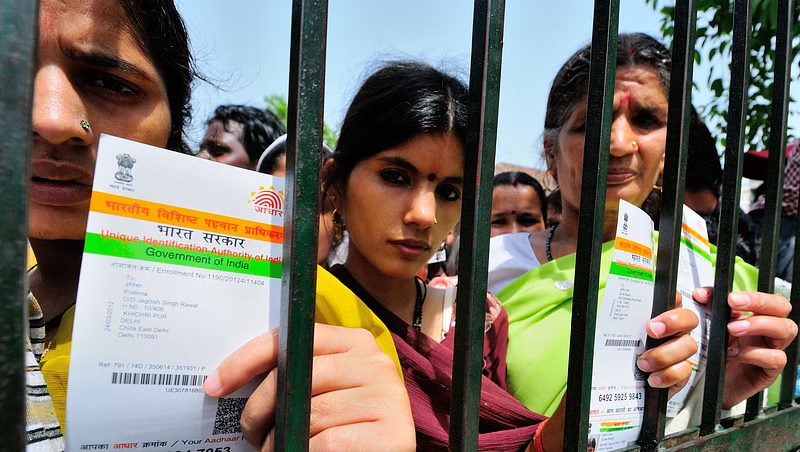
The Supreme Court judgment was not unanimous. There was one dissenting judge in the five-judge bench. Contrast this with another recent judgment by a five-judge bench of the Supreme Court on the repeal of Section 377, decriminalising homosexuality. Therein, lies the deeper lesson in this whole Aadhaar debate. There is a sobering and profound learning in this judgment for all Aadhaar enthusiasts, aka ‘Aadhaar-philes’, myself included.
In 2010, I resigned as the managing director of the French Bank BNP Paribas and volunteered to work with the Unique Identification Authority of India (UIDAI) in the Aadhaar project. A unique opportunity to work in a state-of-the-art, high impact, technology project that promised to radically transform governance was too good to pass.
There were dozens of others like me who joined the project. We truly believed that Aadhaar would usher in enormous efficiency gains in government service delivery. To us, Aadhaar was the panacea that would rid India of its notorious inefficiencies. In our minds, Aadhaar was perhaps as obvious a need for India as the need to repeal bizarre, ancient laws banning homosexuality. So, if decriminalising homosexuality in 21st century India was crystal clear to the Supreme Court, so should have been the need for Aadhaar.
Yet, it is evident that it was not as obvious to the Supreme Court bench, which has ostensibly debated and agonised deeply over the judgment. Aadhaar has stirred strong emotions and has been deeply debated among the ‘policy class’ of the country for nearly eight years now. To most of us Aadhaar supporters, the 12-digit number seemed like a no-brainer solution to our governance problems that the nation should embrace wholeheartedly. But this is apparently not as obvious to the rest of our society. What is it that we missed?
I am reminded of a 2010 dinner conversation I had with then-chairman of Financial Times and Penguin Group, John Makinson. Makinson spent a few days in the UIDAI office trying to understand the Aadhaar project. At that dinner, he remarked casually, “This is a great project with tremendous promise. But I worry that there are not enough people with Humanities backgrounds working on this project to balance the engineers”. Being an engineer myself, I never understood the remark at that time but it nevertheless stayed with me. I can now say that I understand Makinson’s remark.
The Aadhaar project was designed, conceptualised, staffed and built like an engineering project – one that was solely focused on solving the problem of inefficiency in governance. The project saw everything through the lens of improving governance efficiencies and truly believed that alone was enough to offset any implicit social costs. If it was pointed out that a few people were getting excluded from social benefits due to Aadhaar, the response would be Aadhaar has saved so many rupees through efficiency gains by removing duplicates and ghosts.
The idea that a liberal and just society should not punish a single innocent person even if that means letting 10 guilty go scot-free was alien to ‘Aadhaar-philes’. The notion that the end goal of solving a particular problem is supreme, regardless of the means adopted to achieve that solution, is a true engineer’s worldview.
Without most of us realising it, this subconsciously was the culture in the Aadhaar project and we often countered criticism for the project with narratives of its efficiency benefits. This attitude was again on display during the demonetisation period when the founding chairman of UIDAI welcomed the move for its ability to solve the problem of digital payments and catalyse it, regardless of the means adopted to achieve that.
The idea that solving a problem surpasses all else is firmly rooted in an engineer’s belief system. In a 2016 address to technology entrepreneurs in Silicon Valley, US President Barack Obama famously remarked that government does not work like a technology company on purpose. It has to be accountable to everyone with diverse needs and competing interests. It’s way more complicated than serving an app’s user base.
The Supreme Court judgment reflects the fact that societies cannot adopt such a worm’s view of the world and that the means matter as much as the end, however laudable those ends may be. The Supreme Court, by allowing the same Aadhaar tool to be used by democratically elected governments but not by the private sector, has unequivocally implied that efficiency gains cannot be the sole guiding principle in a society.
Similarly, the cheeky and clever-by-half means of the current government to legislate Aadhaar as a money bill to bypass the Rajya Sabha has received pungent criticism by Justice Chandrachud, reiterating the notion that the means matter as much as the ends in a civilised society.
Most ‘Aadhaar-philes’ often wondered who in their right mind could oppose a project that delivered such enormous governance benefits to the nation at large. And most opponents of Aadhaar often wondered who in their right mind can be blind to exclusions and privacy concerns. While the Supreme Court judgement has endorsed Aadhaar for its enormous potential, it has cautioned with equal vigour the social costs of Aadhaar. The real winner in this entire Aadhaar debate is our nation’s ability to embrace nuance and we should be enormously proud of that.
The author is chairman, Data Analytics department of the Congress party and a former scholar in a think tank.
